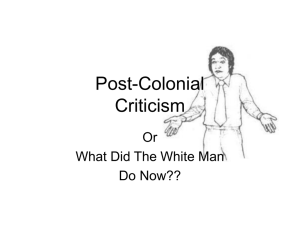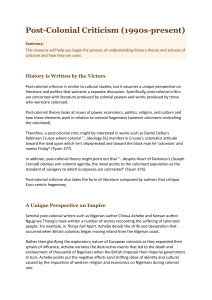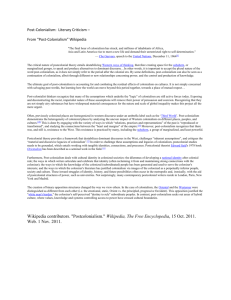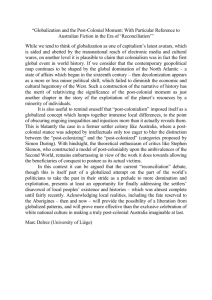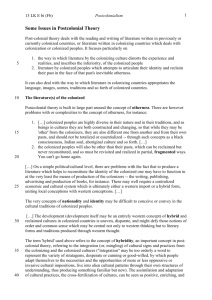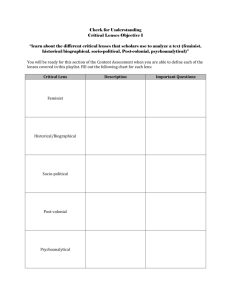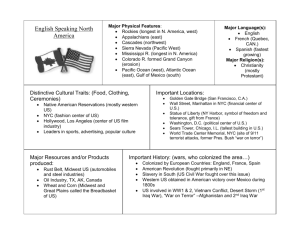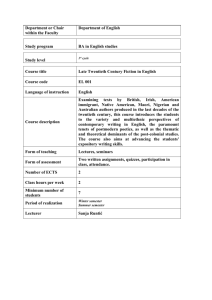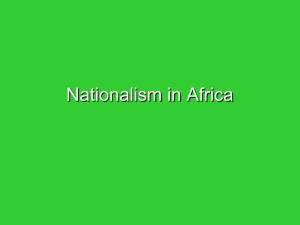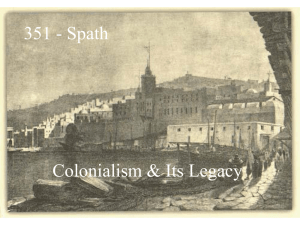Basic Tenets of Post
advertisement
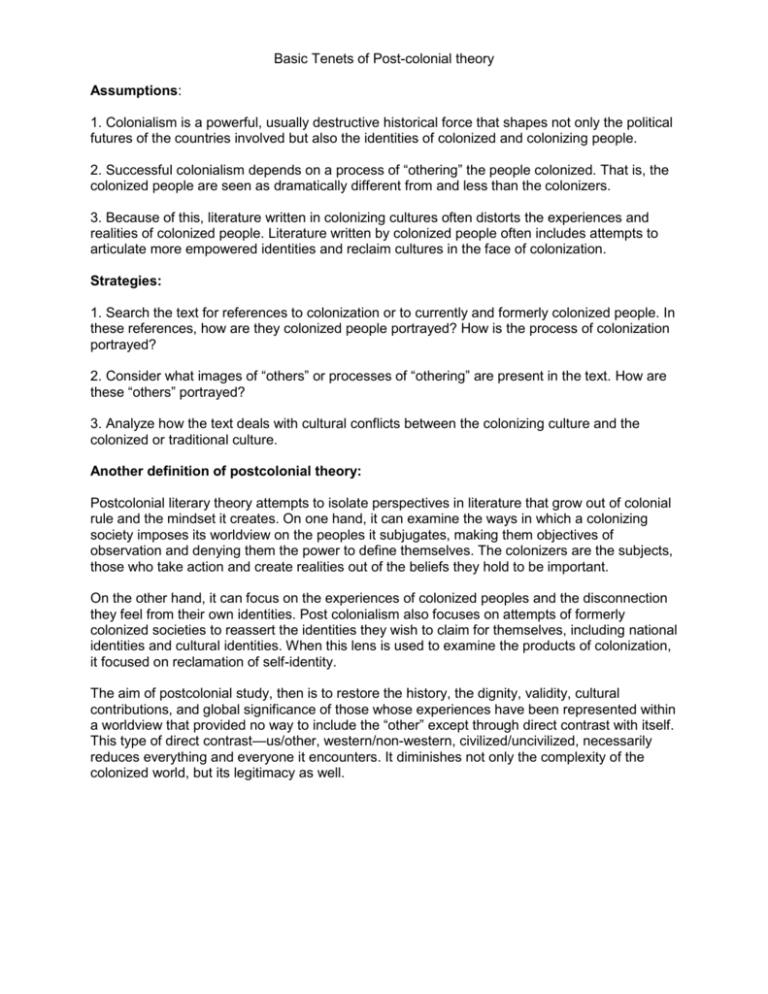
Basic Tenets of Post-colonial theory Assumptions: 1. Colonialism is a powerful, usually destructive historical force that shapes not only the political futures of the countries involved but also the identities of colonized and colonizing people. 2. Successful colonialism depends on a process of “othering” the people colonized. That is, the colonized people are seen as dramatically different from and less than the colonizers. 3. Because of this, literature written in colonizing cultures often distorts the experiences and realities of colonized people. Literature written by colonized people often includes attempts to articulate more empowered identities and reclaim cultures in the face of colonization. Strategies: 1. Search the text for references to colonization or to currently and formerly colonized people. In these references, how are they colonized people portrayed? How is the process of colonization portrayed? 2. Consider what images of “others” or processes of “othering” are present in the text. How are these “others” portrayed? 3. Analyze how the text deals with cultural conflicts between the colonizing culture and the colonized or traditional culture. Another definition of postcolonial theory: Postcolonial literary theory attempts to isolate perspectives in literature that grow out of colonial rule and the mindset it creates. On one hand, it can examine the ways in which a colonizing society imposes its worldview on the peoples it subjugates, making them objectives of observation and denying them the power to define themselves. The colonizers are the subjects, those who take action and create realities out of the beliefs they hold to be important. On the other hand, it can focus on the experiences of colonized peoples and the disconnection they feel from their own identities. Post colonialism also focuses on attempts of formerly colonized societies to reassert the identities they wish to claim for themselves, including national identities and cultural identities. When this lens is used to examine the products of colonization, it focused on reclamation of self-identity. The aim of postcolonial study, then is to restore the history, the dignity, validity, cultural contributions, and global significance of those whose experiences have been represented within a worldview that provided no way to include the “other” except through direct contrast with itself. This type of direct contrast—us/other, western/non-western, civilized/uncivilized, necessarily reduces everything and everyone it encounters. It diminishes not only the complexity of the colonized world, but its legitimacy as well. Postcolonial Lens History is Written by the Victors Post-colonial criticism is similar to cultural studies, but it assumes a unique perspective on literature and politics that warrants a separate discussion. Specifically, post-colonial critics are concerned with literature produced by colonial powers and works produced by those who were/are colonized. Post-colonial theory looks at issues of power, economics, politics, religion, and culture and how these elements work in relation to colonial hegemony (western colonizers controlling the colonized). Therefore, a post-colonial critic might be interested in works such as Daniel Defoe's Robinson Crusoe where colonial "...ideology [is] manifest in Crusoe's colonialist attitude toward the land upon which he's shipwrecked and toward the black man he 'colonizes' and names Friday" (Tyson 377). In addition, post-colonial theory might point out that "...despite Heart of Darkness's (Joseph Conrad) obvious anti-colonist agenda, the novel points to the colonized population as the standard of savagery to which Europeans are contrasted" (Tyson 375). Post-colonial criticism also takes the form of literature composed by authors that critique Euro-centric hegemony. A Unique Perspective on Empire Seminal post-colonial writers such as Nigerian author Chinua Achebe and Kenyan author Ngugi wa Thiong'o have written a number of stories recounting the suffering of colonized people. For example, in Things Fall Apart, Achebe details the strife and devastation that occurred when British colonists began moving inland from the Nigerian coast. Rather than glorifying the exploratory nature of European colonists as they expanded their sphere of influence, Achebe narrates the destructive events that led to the death and enslavement of thousands of Nigerians when the British imposed their Imperial government. In turn, Achebe points out the negative effects (and shifting ideas of identity and culture) caused by the imposition of western religion and economics on Nigerians during colonial rule. Power, Hegemony, and Literature Post-colonial criticism also questions the role of the western literary canon and western history as dominant forms of knowledge making. The terms "first-world," "second world," "third world" and "fourth world" nations are critiqued by post-colonial critics because they reinforce the dominant positions of western cultures populating first world status. This critique includes the literary canon and histories written from the perspective of first-world cultures. So, for example, a post-colonial critic might question the works included in "the canon" because the canon does not contain works by authors outside western culture. Moreover, the authors included in the canon often reinforce colonial hegemonic ideology, such as Joseph Conrad's Heart of Darkness. Western critics might consider Heart of Darkness an effective critique of colonial behavior. But post-colonial theorists and authors might disagree with this perspective: "...as Chinua Achebe observes, the novel's condemnation of European is based on a definition of Africans as savages: beneath their veneer of civilization, the Europeans are, the novel tells us, as barbaric as the Africans. And indeed, Achebe notes, the novel portrays Africans as a pre-historic mass of frenzied, howling, incomprehensible barbarians..." (Tyson 374-375). Typical questions: How does the literary text, explicitly or allegorically, represent various aspects of colonial oppression? What does the text reveal about the challenges of post-colonial identity, including the relationship between personal and cultural identity and such issues as double consciousness and hybridity? What person(s) or groups does the work identify as "other" or stranger? How are such persons/groups described and treated? What does the text reveal about the politics and/or psychology of anti-colonialist resistance? What does the text reveal about the operations of cultural difference - the ways in which race, religion, class, gender, sexual orientation, cultural beliefs, and customs combine to form individual identity - in shaping our perceptions of ourselves, others, and the world in which we live? Are there meaningful similarities among the literatures of different post-colonial populations? How does a literary text in the Western canon reinforce or undermine colonialist ideology through its representation of colonization and/or its inappropriate silence about colonized peoples?
